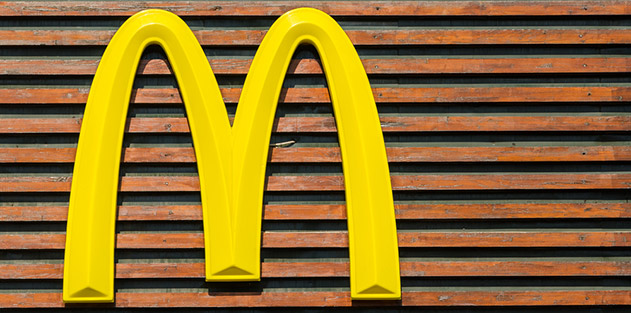Life Without the McDouble:McDonald’s is just one example of how enterprise makes our lives less nasty, brutish, and short by Jeffrey A. Tucker
It thrills me when McDonald’s burgers get the attention they deserve. This happened last year when Stephen Dubner, co-author of Freakonomics, made the provocative statement that the McDouble is the cheapest and most nutritious food in human history.
That we dare to recoil at such a claim indicates how spoiled we truly are. In a state of nature, getting food is the single greatest challenge. You can find shelter and it endures for a time. Clothing made of animal skins can be scarce, but once acquired, it lasts too.
The thing about food is that you have to get it every day. And without tools, you can only eat things that are stationary or very slow-moving. Once you learn to kill, preserving the meat is not easy, which is why salt has been one of the most valuable commodities in the history of humanity.
That most everyone has access to food now is one of the great triumphs of history. As Dubner points out, the McDouble provides 390 calories and 23 grams of protein divided between meat and cheese. All told, one hamburger provides a half day of all the stuff we need to sustain human life, and all for a bit more than a buck.
That McDonald’s can do this as at a profit is wonderful. Its profit margins are variously reported to be around 6% percent—this is an extremely hard business, as any franchise owner can tell you—but many of its most popular products earn no money whatsoever.
The masses of McDouble buyers are being subsidized by customers who buy higher-end products like the Bacon Clubhouse and the super-sized value meals. The best deals are designed to get you in the door in the hope that you will, every so often, splurge just a bit.
Dubner’s thesis got renewed attention in the week following my own renewed love affair with McDonald’s while in Las Vegas this summer. This is a place that picks your pocket at every turn. Okay, granted, every dime spent in Vegas—apart from high taxes and ridiculous union wages—is coughed up by willing buyers. Still, there is an air of voraciousness about the place that seems inescapable.
After days of feeling fleeced for food and drink, I finally found a McDonald’s. The prices were not Vegas prices. The dollar meal was still there. The coffee was delicious and cheap, which is an incredible relief in a city where every cup otherwise runs $5. The breakfasts are wonderful and satisfying. If “healthy food” is your thing, go for the salad, which can’t be beat for the price.
In one food court I entered, there were a dozen establishments, but McDonald’s had the longest line, and consistently so. This makes complete sense to me. Reflect on the ingredients of the Big Mac or the Clubhouse and it just blows your mind. The meat alone is a miracle. Meat wasn’t available for the masses of humanity until canned meat was invented in the the middle of the twentieth century; preserving and transporting it was an extreme challenge.
There is a reason that your knees don’t fit under the desk you found at the antique store, and it’s because of the meat-driven growth in human height we’ve all experienced since World War II.
There is a reason that knight armor at the museum looks like it belongs to a member of the Lollypop Guild—again, it’s because we have access to meat, and those tough guys in the Middle Ages had to live off whatever grew around them.
There is a reason that the average Japanese person is 3.5 inches taller now than 50 years ago, and it comes down to a gigantic dietary change due to the availability of meat and cheese.
In addition, there is bread (if you take that for granted, try growing your own wheat), lettuce (again, only refrigeration made this available for most people), cheese (cows are incredibly expensive to raise), bacon (food of the gods, courtesy of the pig), pickles (the time structure of production here is lengthy), and various sauces that originate in seeds from all over the world.
Somehow they manage to get all of this to you in a small package that costs you a dollar.
But let’s focus for just one moment on the least-appreciated ingredient in ketchup and on the burger itself: the tomato. Surely it has always been with us, right? Anyone can grow tomatoes in a pot on the back porch. That wasn’t true until the sixteenth century, when Europeans had their first wide exposure to the tomato. Spanish explorers brought the fruit back from Latin America. Before then, there was no such thing as the tomato in the Italian diet.
It was trade that brought the tomato to the whole world for the first time in the Renaissance period. Without trade, without travel made possible by technology and capital investment, we’d never know how one tasted.
This reality never occurred to me until I read A Splendid Exchange: How Trade Shaped the World, by William Bernstein (2008). It turns out that staples such as coffee, beef, and the potato, and the existence of practically everything in your refrigerator, is owed to trade, technology, and therefore to the existence of free enterprise.
I was once lecturing to a group of students about the problems that come with the state of nature, of just trying to survive based entirely on the resources around you, while fighting off nature’s penchant for exterminating human beings that don’t fight back. I asked the group what people invented some 150,000 years ago in order to survive in the face of massive privation and the growing scarcity of food.
The answer I was looking for was this: They invented private property to allow them to domesticate animals and enclose spaces for agriculture. But the first answer that was offered from the audience was: Create a government. My mouth fell open in amazement. But after just a few moments, the student starting laughing and then everyone joined in.
Why laugh? Because creating a government—assigning a small group to control a geographic space with a monopoly on weapons and allowing them to pillage and kill as they see fit—does absolutely nothing to solve the core problem that humanity faces. Just stating the answer this way illustrates the absurdity. Our problems as a species are solved when we figure out how to get more of what we need and want. Governments, on the other hand, only redistribute what already exists.
Governments come and go, but the achievements of trade and private enterprise last generations and then even become permanent features of the world. Once a good is transported, once a technology is invented, it becomes part of the capital stock of civilization to be enjoyed by every generation thereafter.
That we were born now and live now to enjoy the massive beneficence of the struggle of thousands of years to bring us things like the tomato, beef, cheese, bread, and to wrap it all up in a tiny package and make that available to us for a dollar in nearly every city in the world, that this comes to us with no work on our part, is a gigantic privilege afforded us by virtue of accident or providence (depending on your religious views). To whatever force you attribute your good fortune, we should recognize it as such.
The McDouble does not appear in nature. That we can laugh at it, put it down, sneer at it, and even denounce the company that brings it to us is a wonderful privilege of the ungrateful. Those who know and understand don’t have to eat at McDonald’s, of course. But everyone should at least recognize its restaurants as symbols of what humankind can achieve when we are given time and freedom to make great things happen–and to overcome the grueling state of nature that has pervaded all but a small fraction of the history of humanity.
I’m only asking that we think about that seriously before we sneer.
 ABOUT JEFFREY A. TUCKER
ABOUT JEFFREY A. TUCKER
Jeffrey Tucker is a distinguished fellow at FEE, CLO of the startup Liberty.me, and publisher at Laissez Faire Books. He will be speaking at the FEE summer seminar “Making Innovation Possible: The Role of Economics in Scientific Progress.”
EDITORS NOTE: The featured image is courtesy of FEE and Shutterstock.

